Of all the factors associated with the demise of our planet, the one which seems to have caught the public’s imagination most is plastics and plastic pollution of the oceans and the damage that is being done to marine life by them. And they want immediate action, as evidenced by comments on a recent BBC phone-in programme about the issue.
In the UK, watchers of the TV programme Blue Planet II, have had their awareness raised about the huge distress and death caused to many thousands of animals through plastic debris in the sea, as typified in the photograph of a dead penguin, caught up in plastic below:
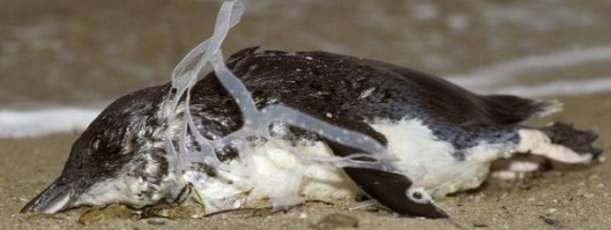
This is just one example of the many horrifying and distressing photographs of creatures caught in plastic debris and fishing nets, which can be found by searching google images: turtles, seals, fish, sea birds and so on – all dead and dying because they have become trapped in plastic waste floating in the sea.
A sperm whale recently washed up dead on the Spanish coast and its stomach was full of 29 Kg of plastic, blocking its digestive system and causing its death. Altogether a massive 8 million tonnes of plastic ends up in the oceans each year.
And so, the public is beginning to demand that something be done about the use of plastic packaging for everyday products, much of it bought at the supermarket.
A letter from 200 MPs from seven different political parties urged the country’s major supermarkets to scrap plastic packaging. And the Queen has also banned plastic straws and bottles from the royal estate.
Friends of the Earth have invited people to take a pledge to have a #PlasticFree Friday.
Prime Minister Theresa May also announced her proposed policies on plastic-free aisles in supermarkets and a tax on takeaway containers. She plans to limit all avoidable plastic waste within 25 years. TWENTY FIVE YEARS! ARE YOU SERIOUS? The public want it banned right now. Even the supermarket, Iceland’s plan to have no plastic packaging in their supermarkets in FIVE years time is not soon enough. So, let’s get serious about this.
I grew up at a time when there were no supermarkets and I remember accompanying my mother to the local grocer, who would weigh out the goods she ordered, tip them into a brown paper bag, twist the corners to close it and then Mum would place it in her linen shopping bag and take it home. No plastic in sight.
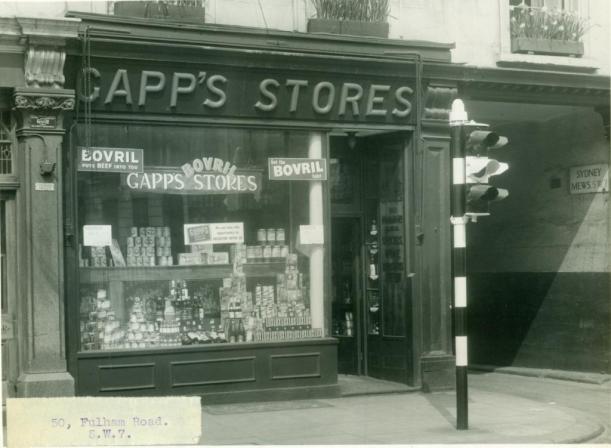
A small corner shop from the 50s – pre-supermarkets
It was encouraging therefore to hear about a man who has opened a plastic-free supermarket in Digbeth, Birmingham in July 2018. See:
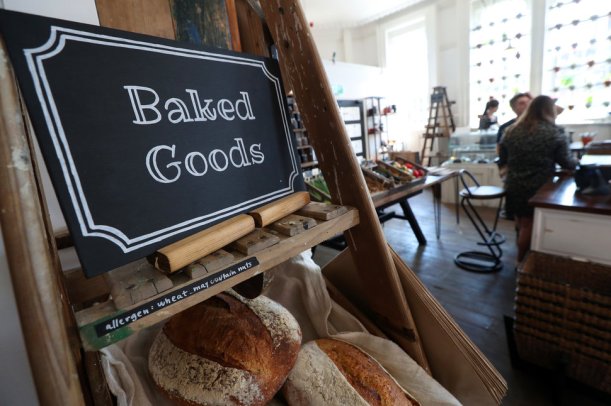
The plastic-free shop in Digbeth, Birmingham
And Greenpeace are campaigning for this too. Let’s hope that the impact of the Blue Planet II series will also reach beyond these shores and set off a global response to this shocking issue.
Greenpeace have produced a youtube video, which describes the issues about supermarkets and plastics and whether “biodegradable” plastics are a good idea. See:
An article by Roger Harrabin on the BBC website states that there is already an international law against polluting the oceans with plastic. However, he comments that, as legal action needs to be taken by a country, rather than individuals, those smaller nations, such as islands, are unlikely to take the larger countries to the International Court of Justice. The greatest plastic polluters of the oceans are China, India and Indonesia. His article contains a map showing the biggest plastic polluters:
http://www.bbc.co.uk/news/science-environment-43115486
Turtles and plastic
A piece of research, carried out by the University of Queensland in Australia, has demonstrated that one in three sea turtles has eaten plastic. This can kill them or make them very ill, as it can either perforate the internal organs, leading to septicaemia, or cause a condition called ‘floater syndrome’, which makes the turtle more buoyant and unable to swim down to lower depths to feed on sea grass. As a result, sea turtles are now an endangered species. A short piece of video shows a turtle with floater syndrome. See:
https://www.huffingtonpost.com.au/2016/03/17/turtles-marine-plastic_n_9455496.html

Sea turtle in sea grass
This is not about plastic but I insert it here because there is some news breaking from Australia that 99% of green sea turtles born in Northern Australia are now female. This is due to global warming, as the temperature of the sand incubating turtle eggs can determine the gender of the hatchling. Ultimately, this could lead to the loss of this species, with no male turtles to fertilise the offspring.
Microplastics found in tap water and sea salt
The Guardian reported on numerous studies which have found microplastics in tap water, bottled water and sea salt. It is not yet known whether this has an effect on human health.
The UK campaigning group, 38 Degrees, have recently emailed their supporters outlining successes they have had with their petition-focused campaigns. The following is taken from their latest email about plastics:
In recent months 38 Degrees members have played a huge role in tackling plastic waste. In March, after months of campaigning from 38 Degrees members and other campaign groups, Environment Minister Michael Gove announced a plan to bring back a bottle deposits recycling scheme in England.
Here’s how we did it:
- 329,314 of us signed the petition – one of the biggest in 38 Degrees history – demanding that Michael Gove did the right thing to tackle plastic pollution
- We handed in the petition in style straight to 10 Downing Street – complete with a boat made of bottles
- A huge 150,944 of us told the government what we thought about plastic and litter when they asked for the public’s thoughts
- We chipped in fivers and tenners for polling to show that the public was behind the idea of a bottle deposit scheme and it made it into national news
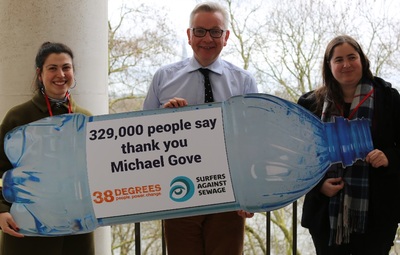
And it’s not just the government that 38 Degrees members pressured into taking plastic waste seriously – we’ve convinced big businesses to change their ways too.
When Mike, a gardener from Wrexham in Wales, discovered his morning cuppa was harming the planet he started a 38 Degrees petition asking Britain’s biggest tea company, PG Tips, to remove plastic from their tea bags.
More than 200,000 of us joined his campaign. We signed petitions and spread the word among our friends and family. And when it seemed like PG Tips were ignoring the issue, we upped the pressure. Tens of thousand of us emailed them directly and wrote on their Twitter and Facebook pages…. And it worked! PG Tips announced they would aim to make their tea bags plastic free by the end of this year.
June 2018:
The BBC TV programme “Springwatch” featured the whole plastics issue this week and found groups of people in different parts of the country who were removing plastic waste from beaches and rivers. Well done!
Another campaigning organisation, Global Citizen, have circulated an email on the subject of plastics, as follows:
“Today is World Oceans Day, a day to celebrate our beautiful oceans, and to take action to protect them — because they’re in trouble.
Earlier this year, thanks to Sir David Attenborough and his epic BBC series Blue Planet II, we opened our eyes to plastic pollution, which is wreaking havoc on oceans, wildlife, and on people in the poorest countries who are often worst hit, but least responsible.
Now, we’re taking a stand against plastics that we use once and then throw away — like drinking straws, bottles, and bags — and we want governments and businesses to join us.
Plastic pollution has a detrimental impact on people’s health, with a disproportionate impact on the world’s poorest. It pollutes life-sustaining rivers, causes diseases, and floods poor communities that lack proper facilities for collecting and disposing of waste.
The numbers are appalling. There are over 5 TRILLION pieces of plastic already in the ocean — and if we stay on our current trajectory, there will be more plastic than fish in the sea by 2050.
Change is happening. Countries like the UK are cracking down on plastic pollution by exploring sustainable alternatives, such as providing greater access to water fountains to reduce plastic bottle waste. Businesses like Tesco and Iceland are also pledging to tackle unnecessary plastic waste in their supermarkets, but we want to see more governments and businesses to follow their lead.
This World Oceans Day, take part in the plastic revolution: call on governments and businesses to commit to ending the distribution of single-use plastics, and to develop renewable alternatives that won’t threaten our planet — and the people who inhabit it.
With hope,
Marissa and the Global Citizen team”
Many companies are now stating that they will phase out plastic straws but the dilemma is what to replace them with. Now, a new company is opening up in Wales to meet the demand. It is Transcend Packaging, based in Ebbw Vale and has already signed a deal with McDonalds to supply paper straws to their 1,361 outlets. See:
At a European level, a new law has been proposed to ban single-use plastics but the EC is being lobbied by the plastics industry not to ratify this law. As a result, a petition has taken off to get ordinary people to pressure the EC to maintain its proposals on plastics. Europe is the world’s second largest producer of plastic. See:
WeMove.EU
Not all plastics are recyclable!
News is coming out that only a third of all the plastics that we put in our recycling bins can actually be recycled. The black plastic trays frequently used for microwave meals cannot be recycled. Nor can other items which may contain a mixture of different kinds of plastics.
According to the Guardian (4th August 2018), local authorities are saying that two thirds of plastics cannot be recycled and are sent to landfill or incinerated. They are urging industry to stop using plastics to package their goods. The LGA is saying that manufacturers should work with councils to develop a plan to stop the use of unrecyclable plastic and that the government should consider a ban on low-grade plastics. They also believe that producers should contribute to the cost of collecting and disposing of plastic products.
September 2018
The UK government website state that there is strong public support for measures to reduce the use of plastics. Here is the text of the statement:
And, according to George Monbiot, the problem is not just about plastics but about consumerism:
https://www.monbiot.com/2018/09/12/plastic-soup/
October 2018
Greenpeace, in their newsletter “Unearthed” have announced that they have been following up what happens to plastics sent from the UK and other European countries to be re-cycled in Malaysia. They report the following:
“We have a breaking story in the news. It’s about the hundreds of thousands of tonnes of plastic scrap that the UK sends abroad every year to be recycled.
For the past year, I’ve been finding out where it goes – and if it actually gets recycled.
Two weeks ago, we went out to Malaysia – where a quarter of UK plastic scrap exports are sent – to follow up on reports of illegal dumping there.
In the illegal dumps, we found: packaging for Fairy dishwasher tablets, Yeo Valley yoghurt and Tesco finest crisps, alongside plastics from Spain, France, Germany, Ireland, Japan and Australia. In an adjoining recycling facility that was shut down months ago, we also found ripped-open recycling bags from UK local authorities discarded among a huge pile of plastic bags.”
You can read the story – and see all the pictures – here.
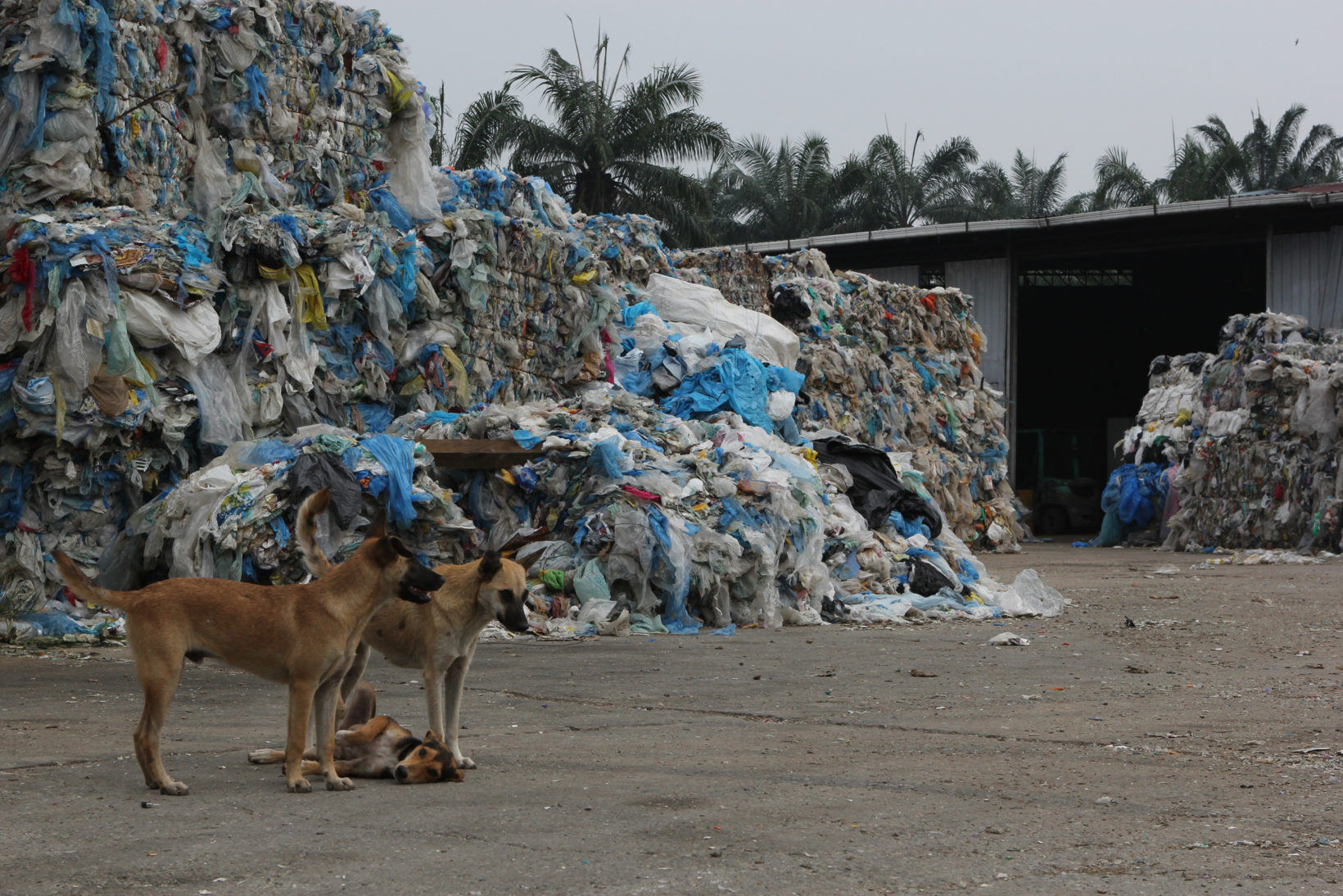
October 2018:
The Huffington Post published details of which company’s products contributed to most of the plastic pollution in the world. This was derived from an analysis of 187,000 pieces of plastic found on beaches in 42 countries (249 clean-ups).
CocaCola, PepsiCo and Nestle produced the majority of the plastics analysed.
Coke branded plastic was found in 40 countries; PepsiCo and Nestle came second and third.
Other company’s plastics found in at least 10 countries were:
Danone, Mondelez, Procter & Gamble, Unilever, Perfetti van Melle, Mars, and Colgate-Palmolive.
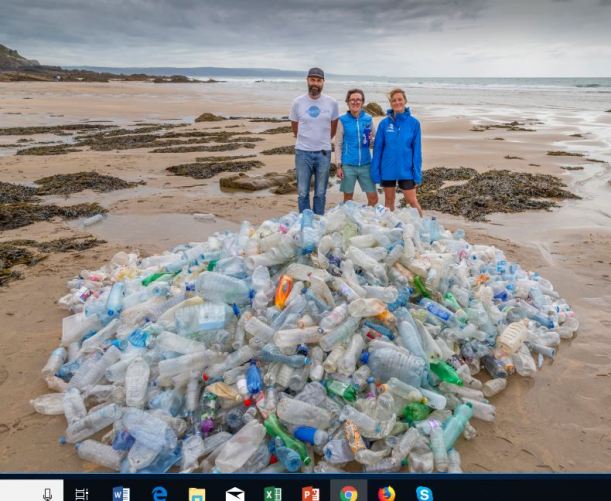
Picture published by Cornwall Wildlife Trust after a beach clean-up
January 2019
The Guardian has announced that it is phasing out the polythene wrappers that have been used to enclose its additional reports at weekends. Instead of using polythene, it will now use wrappers made of potato starch. These can be recycled in a composter. See:
https://www.bbc.co.uk/news/uk-46849937
March 2019
A report in The Guardian tells the story of a young Cuvier’s beaked whale washed up on a beach in The Philippines. It had 40 Kg of plastic in its stomach and had died of gastric shock. The plastic included 16 rice bags 4 banana plantation bags and multiple shopping bags.
March 2019
The European Union passes legislation to remove single-use plastics.
According to the European Commission, more than 80% of marine litter is plastics. The products covered by this new law constitute 70% of all marine litter items. Due to its slow rate of decomposition, plastic accumulates in seas, oceans and on beaches in the EU and worldwide. Plastic residue is found in marine species – such as sea turtles, seals, whales and birds, but also in fish and shellfish, and therefore in the human food chain.
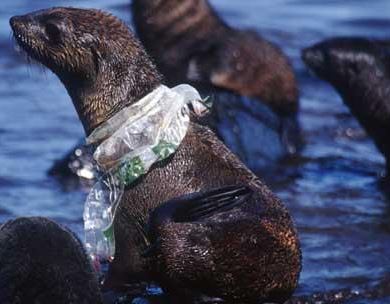
Parliament approved a new law banning single-use plastic items such as plates, cutlery, straws and cotton buds sticks. 560 MEPs voted in favour of the agreement with EU ministers, 35 against and 28 abstained.
The following products will be banned in the EU by 2021:
- Single-use plastic cutlery (forks, knives, spoons and chopsticks)
- Single-use plastic plates
- Plastic straws
- Cotton bud sticks made of plastic
- Plastic balloon sticks
- Oxo-degradable plastics and food containers and expanded polystyrene cups
New recycling target and more responsibility for producers
Member states will have to achieve a 90% collection target for plastic bottles by 2029, and plastic bottles will have to contain at least 25% of recycled content by 2025 and 30% by 2030.
The agreement also strengthens the application of the polluter pays principle, in particular for tobacco, by introducing extended responsibility for producers. This new regime will also apply to fishing gear, to ensure that manufacturers, and not fishermen, bear the costs of collecting nets lost at sea.
The legislation finally stipulates that labelling on the negative environmental impact of throwing cigarettes with plastic filters in the street should be mandatory, as well as for other products such as plastic cups, wet wipes and sanitary napkins.
Quote
Lead MEP Frédérique Ries (ALDE, BE) said: “This legislation will reduce the environmental damage bill by €22 billion – the estimated cost of plastic pollution in Europe until 2030. Europe now has a legislative model to defend and promote at international level, given the global nature of the issue of marine pollution involving plastics. ”
May 2019
A recent report states that Sir David Attenborough has warned that the growing tide of plastic pollution is killing up to a million people as year as well as having devastating consequences on the environment.
A report on the impact of plastic pollution, one of the first to document the impact of discarded plastic on the health of the poorest people in the world, estimates that between 400,000 and one million people die every year because of diseases and accidents linked to poorly managed waste in developing countries.
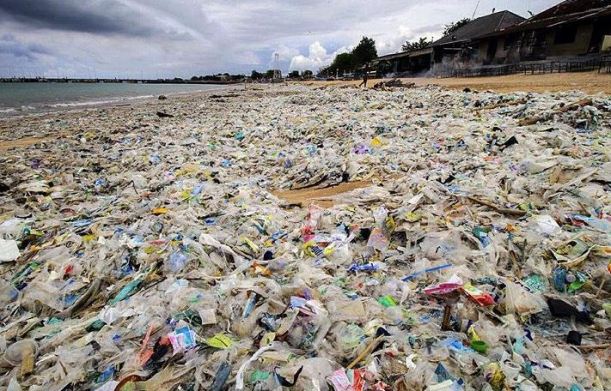
Plastic waste on a beach in Bali, Indonesia
Sir David, whose Blue Planet TV programme alerted the world to the damage plastic was wreaking on the oceans, says that the effects of plastic pollution is an “unfolding catastrophe that has been overlooked for too long”.
He said it was time to act “not only for the health of our planet, but for the wellbeing of people around the world”.
“We need leadership from those who are responsible for introducing plastic to countries where it cannot be adequately managed, and we need international action to support the communities and governments most acutely affected by this crisis,” he said.
Just one in four people around the world have their rubbish collected so plastic and other waste often ends up discarded in the environment, blocking waterways and drains. This leads to flooding, which, in countries with poor sanitation, leads to outbreaks of cholera and other diarrhoeal diseases, as well as drowning. Discarded plastic also provides a fertile ground for disease vectors such as malaria- and dengue-carrying mosquitoes which breed in the rainwater collecting in waste.
The report also highlights the link between plastic waste and air pollution. For many in low and middle income countries the only way to get rid of plastic and other waste is to burn it, releasing toxic fumes into the air.
The effects of microplastics on human health is still unknown.
Also, in the news this week is a report that the deepest ever submarine dive in the Mariana Trench in the Pacific Ocean has taken place and that plastic waste was found on the floor of the ocean even at this deep level.
The Guardian – May 24th 2019:
The proliferation of single-use plastic around the world is accelerating climate change and should be urgently halted, a report warns.
Plastic production is expanding worldwide, fuelled in part by the fracking boom in the US. The report says plastic contributes to greenhouse gas emissions at every stage of its lifecycle, from its production to its refining and the way it is managed as a waste product.
This plastic binge threatens attempts to meet the Paris climate agreement. It means that by 2050 plastic will be responsible for up to 13% of the total “carbon budget” – equivalent to 615 coal-fired power plants – says the research published on Thursday.
The contribution of plastic production and disposal to climate change has been largely hidden, say the authors of the report by the Center for International Environmental Law, which estimates the greenhouse gas footprint of plastic from the cradle to the grave for the first time.
